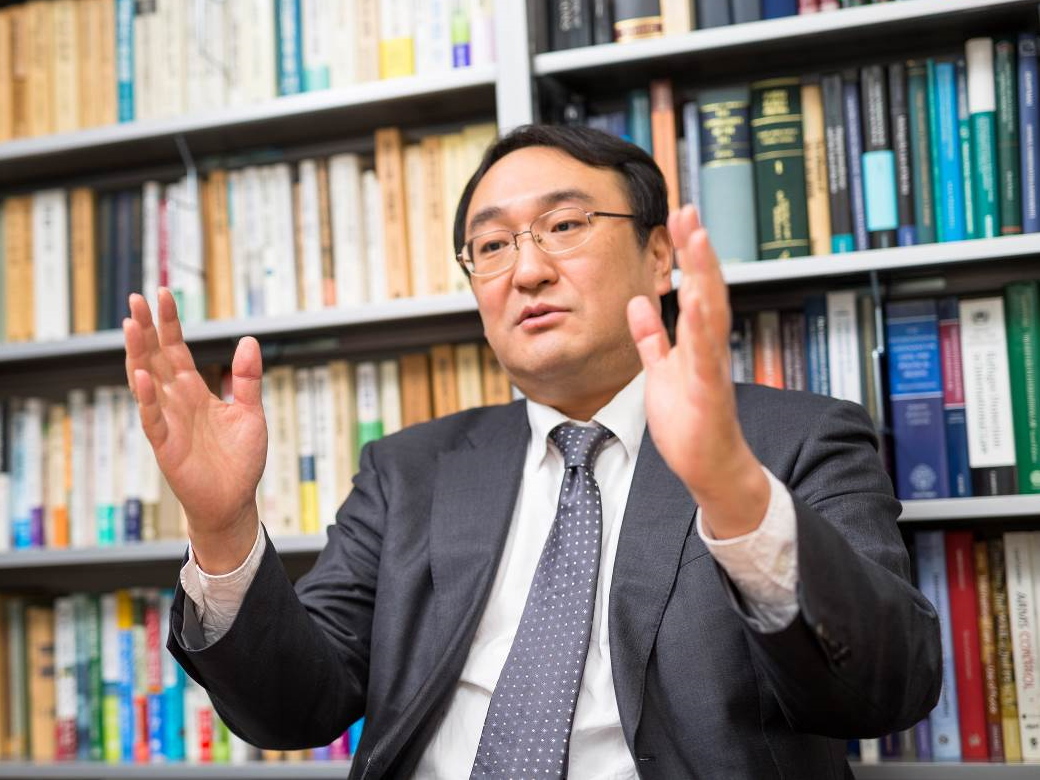Waseda Frontline Research Vol.15: Aiming to organize the legal system related to state responsibility (Part 1 of 2)
Mon, May 15, 2017-
Tags
Researcher on international law
Hiroyuki Banzai, Professor, Faculty of Law
Discussing Professor Banzai’s book “Study on the Responsibility for Internationally Wrongful Acts,” a compilation of state responsibility theory
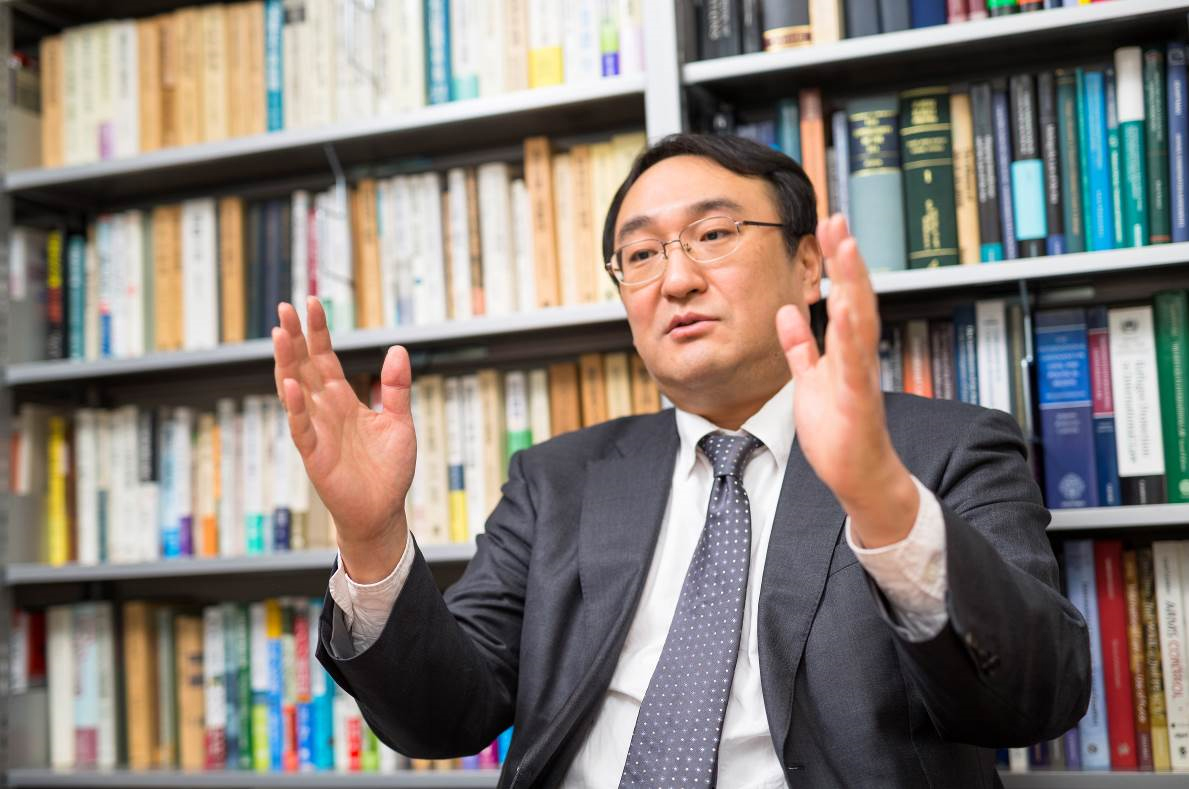 In November 2016, Professor Hiroyuki Banzai received the Adachi Memorial Award, which recognizes outstanding achievements in international law research, for his book “Study on the Responsibility for Internationally Wrongful Acts.” The book serves to systematize the laws of state responsibility based on approximately 40 years of debate by the International Law Commission during the formulation of the Articles on Responsibility of States for Internationally Wrongful Acts (referred to below as Articles on Responsibility of States).The Center for Research Strategy asked Professor Banzai about how to perceive responsibility for internationally wrongful acts amid wavering international relations, for instance, between Japan and South Korea as well as Japan and the US.
In November 2016, Professor Hiroyuki Banzai received the Adachi Memorial Award, which recognizes outstanding achievements in international law research, for his book “Study on the Responsibility for Internationally Wrongful Acts.” The book serves to systematize the laws of state responsibility based on approximately 40 years of debate by the International Law Commission during the formulation of the Articles on Responsibility of States for Internationally Wrongful Acts (referred to below as Articles on Responsibility of States).The Center for Research Strategy asked Professor Banzai about how to perceive responsibility for internationally wrongful acts amid wavering international relations, for instance, between Japan and South Korea as well as Japan and the US.
(Date of interview: January 7, 2017)
Wrongful acts committed by states
To begin with, “inter” in international means “between,” so international laws are based on conventions between nations. In principle, therefore, states are responsible for international wrongful acts. However, a state itself does not have any physical form, and actions by a state always seem as if they were carried out by someone specific.There are difficult problems inherent in state responsibility: What is regarded as an act of state, and what are the conditions the conditions to hold a state accountable for violating international law and to generate responsibility?On the other hand, not only states but also individuals can sometimes be held responsible. If a country starts a war of aggression, the decision makers of this war will also find themselves subject to judgement. International organizations such as the United Nations can also be held responsible if some kind of damage occurs as a result of actions based on a UN resolution.
Under international law, a state is held responsible in a breach of obligation of some kind. A breach of obligation points to any differences between the demands upon a state according to international law and the actions actually taken. For example, the inviolability of embassies is recognized in every country in the world. If it a mob attacks an embassy of some country in Japan, the Japanese government is obliged to take due care to protect that embassy, say, by deploying police. Failure to meet this obligation would incur responsibility.
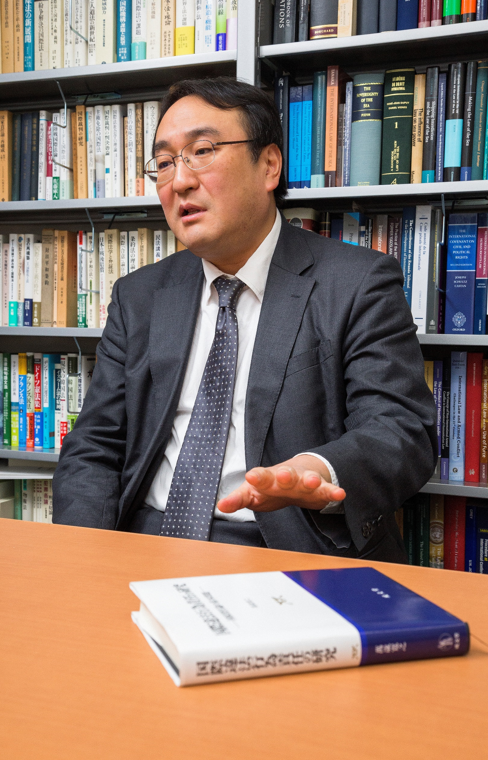
Photo: Professor Banzai in his office, discussing his book, which received the 49th Adachi Memorial Award. This award is associated with the achievements of diplomat and scholar of international law, Mineichiro Adachi, who served as president of the Permanent Court of International Justice (PCIJ) before the Second World War. The award is presented in recognition of outstanding performance in international law research. At the award ceremony in Tokyo, Professor Hiroyuki Banzai received the 49th Adachi Memorial Award for his book “Study on the Responsibility for Internationally Wrongful Acts (Seibundoh Publishing).” (Source: Digital Mainichi, November 22, 2016 (Tokyo evening edition), partly edited)
Specified treaties and unwritten customary laws
International laws are conventions between countries, but the main kinds, academically referred to as sources of law, are treaties and customary laws. Treaties are written conventions between countries including bilateral treaties, such as the Japan-US Security Treaty, and multilateral treaties like the United Nations Charter, which involves almost every country in the world. The Paris Agreement is another recently adopted multilateral treaty on climate change. In contrast, there are unwritten customary laws, which all countries must obey even though they are not explicitly stipulated. A typical example of customary international law is the commitment to non-interventionism, which prohibits interference in the domestic issues of other countries.
There was a major trend regarding customary international laws starting in the 1960s, when African nations began to declare independence one after another. Because customary laws exist as unwritten laws, it is difficult to know what constitutes a customary law in places such as emerging nations, where books and documents are not accumulated. In addition, customary laws benefited Western countries which colonized other countries in the past. To improve this situation, there was a strong demand to codify these unwritten customary laws.
Nearly 40 years of debate by the International Law Commission
In the process of turning unwritten customary laws into written treaties, all United Nations member states are given the chance to express their opinions. When it comes to expressing opinions on this treaty drafting, all countries are on equal footing, whether large or small, and each country has one vote. In this way, the will of every country is reflected in the drafts by the International Law Commission.
At the core of this process is the United Nations General Assembly, while the auxiliary body for carrying out the practical work of codification is the International Law Commission. In the actual process, the International Law Commission first deliberates and puts together a draft every spring. This draft is then examined in autumn by the United Nations General Assembly, particularly the Sixth Committee, which is its legal committee. The Sixth Committee receives official comments on the draft from representatives of the 194 member countries, and the International Law Commission makes further revision of the draft based on these comments.
As a result of repeating these spring and autumn events for approximately 40 years, the Articles on State Responsibility were finally adopted in 2001. Yet, major social changes since the end of World War II, such as decolonization and the collapse of the Iron Curtain, also affected international law, and a common view on the role of responsibility laws among the states was not easily reached. Because of this, the Articles on State Responsibility, compiled over a period of nearly 40 years, fall short of being a definitively adopted treaty.
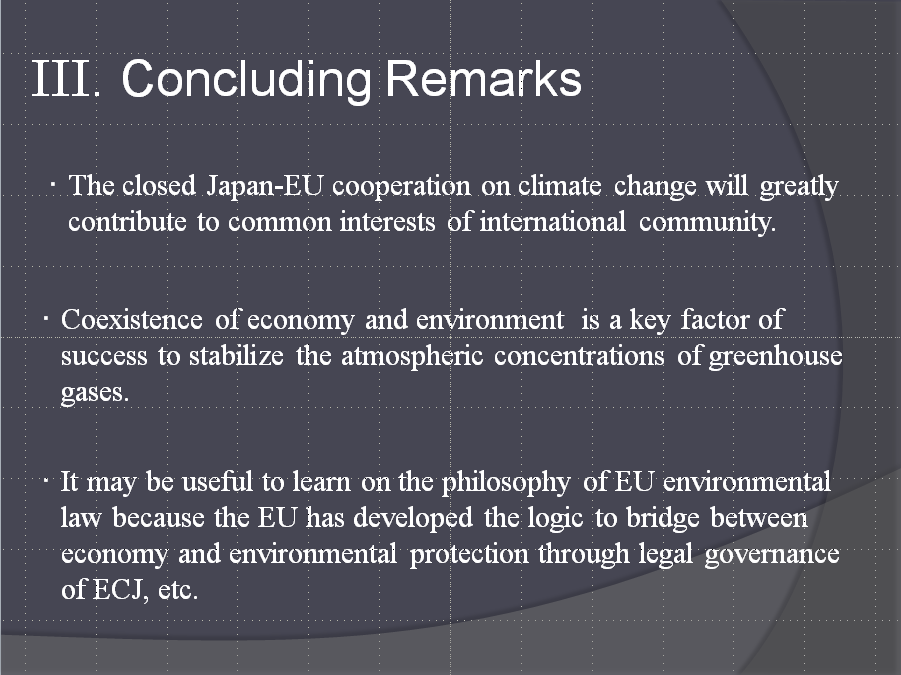
Figure: Quoted from Professor Banzai’s presentation titled “Joint Leadership on Global Challenges – Climate Change” in the symposium on the future of EU-Japan relations (2003 version), which was broadcast worldwide on online television (Source: Hiroyuki Banzai)
Gradual spread of Articles on State Responsibility
In spite of being created over a very long period of time, some people may deem the Articles on State Responsibility as meaningless because they are not fully implemented. More than a decade after their adoption,however, countries are starting to pick out and apply some of the Articles on State Responsibility. If we read the judgments of the International Court of Justice very carefully, we find cases in which some of the Articles on State Responsibility are used as a basis for arguments. They will become increasingly important as countries acknowledge the fact that the International Court of Justice has used them in its arguments.
In this way, awareness of countries for the international society and international law is changing, albeit slowly,and the International Law Commission and the United Nations General Assembly are continuing to make legislation based on such changes. In this constantly changing situation, countries sift through the provisions of the Articles on State Responsibility, while international courts adopt the Articles on State Responsibility as the basis for their judgments. Through this series of processes, the Articles on State Responsibility are partially being accepted by the international society. In one such case where a state had been negligent in punishing or extraditing a person who had committed an act of torture, the International Court of Justice handed down a judgment stating that in order to prevent the torturer from going unpunished, the victims of the torture had certain rights to pursue accountability even though they were not citizens of that country. As of 2001, this was an important case of a legislative proposal by the International Law Commission being adopted by the International Court of Justice as a law in force.
Systematically organizing the Laws of State Responsibility
Receiving the Adachi Memorial Award was simply by good fortune. First of all, before the Articles on State Responsibility were compiled in 2001, nobody had been able to engage in systematic research. The work of the International Law Commission consists of a first reading and a second reading, but the first reading took many years and its accumulated arguments were disfavored, so the second reading of just five years was a major revision of the first reading draft. During the time of the second reading, Chusei Yamada, the former Japanese Ambassador to India who was serving on the International Law Commission, took me to the Commission in his capacity as a specially-appointed professor at Waseda University. I was a doctoral student then, and my advisor, Professor Yukio Shimada, encouraged me to go.
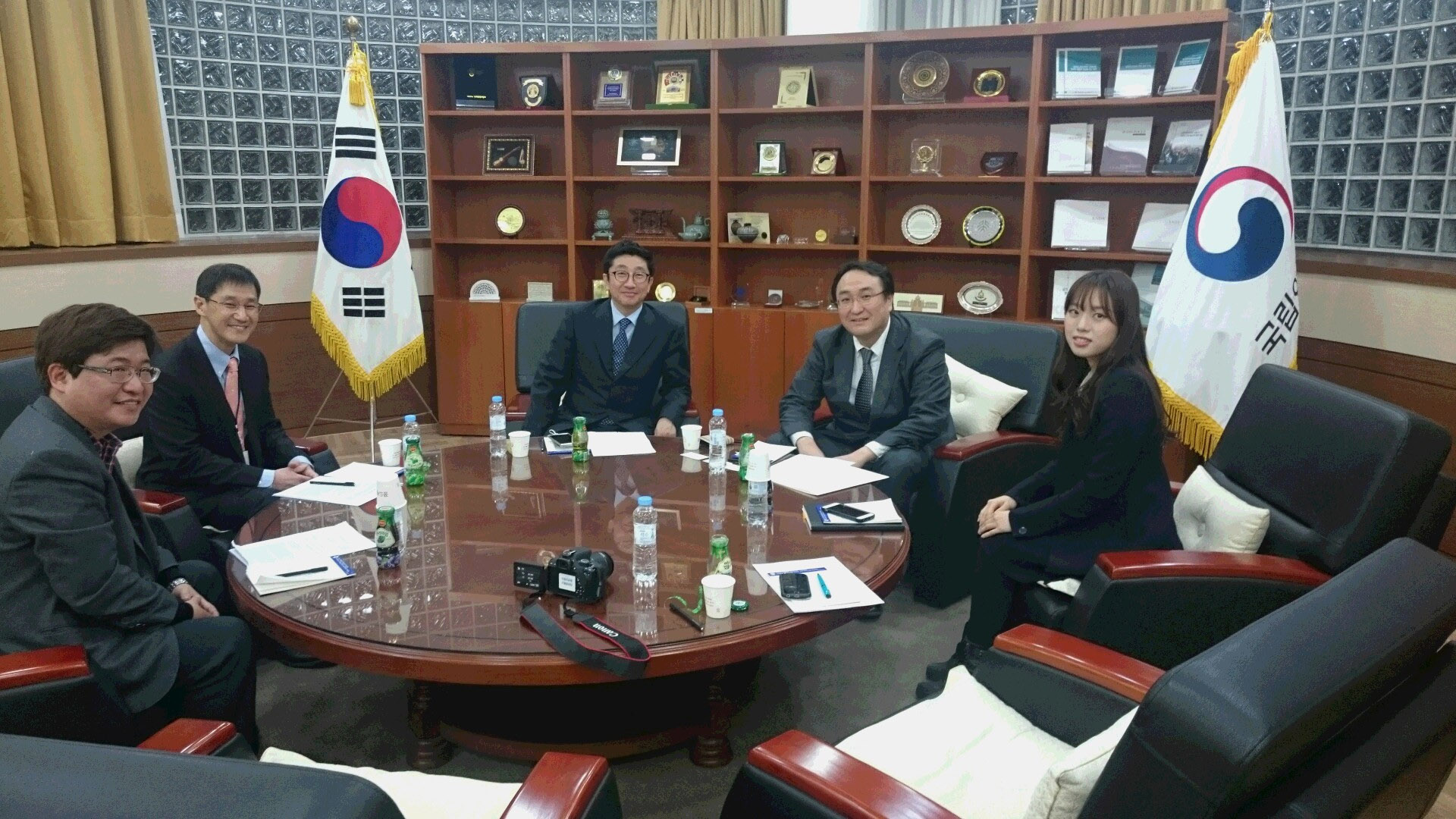
Photo: Meeting at the Korea National Diplomatic Academy. The woman on the right is alumna Yun Jihe (Source: Hiroyuki Banzai)
Specializing in state responsibility, I had read the materials thoroughly beforehand, so I had a basic understanding in what went on. Moreover, I was able to see what the issues were with my own eyes where it was all happening. Although the whole picture is not fully clear yet, the judgments are now starting to finalize after all these years. Building upon this experience, I have systematically compiled the fundamental issues of state responsibility to sum up.
It is true that I somewhat had foresight because I was able to listen to the actual debates by the International Law Commission. I feel very lucky to have had the unique network of Waseda University and am deeply grateful that it has led to my receiving this award.
In Part 2, Professor Banzai will discuss international law with Kimitake Nakamura from the Ministry of ForeignAffairs, who teaches an advanced course on international law (security) at Waseda University.
Profile
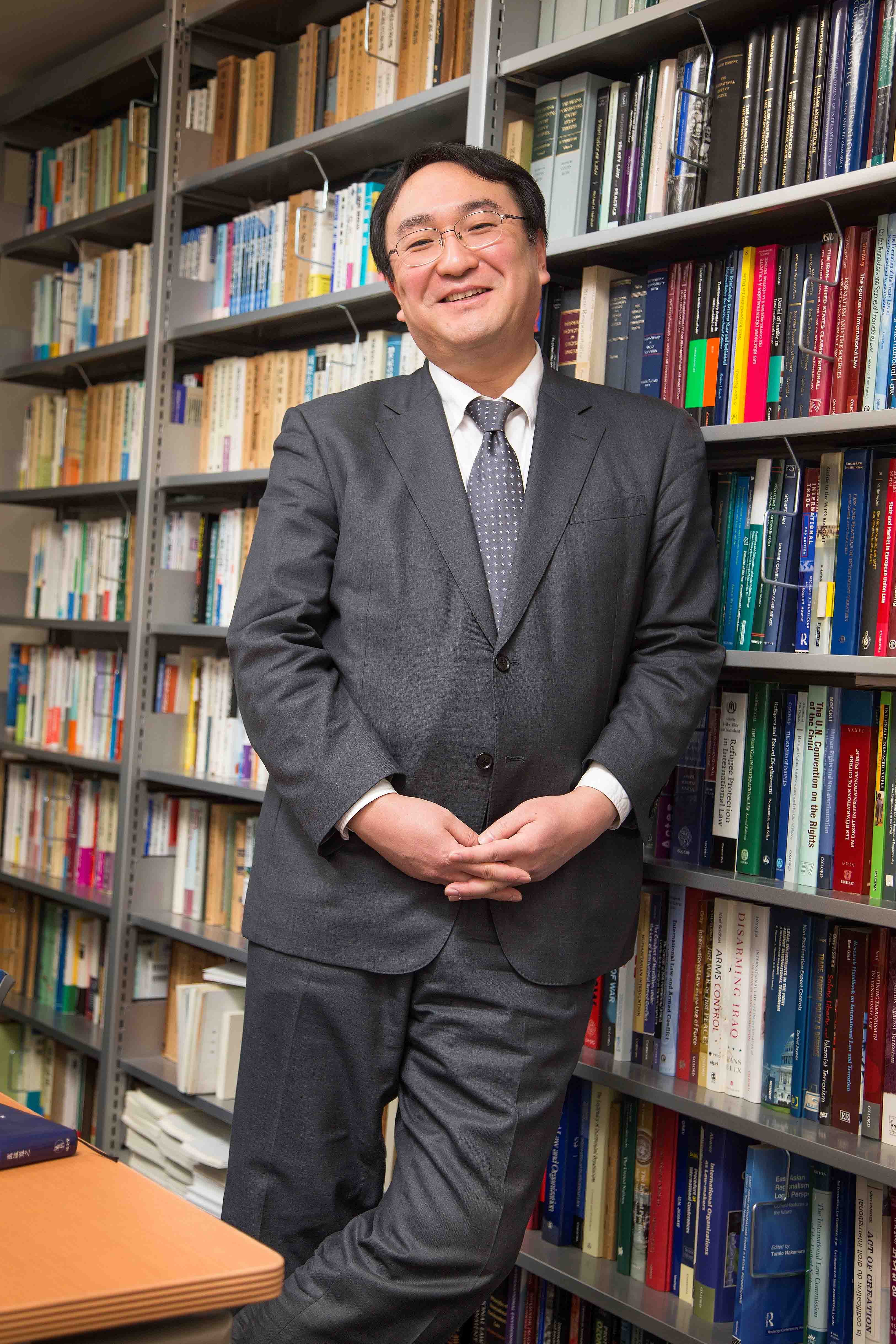 Hiroyuki Banzai
Hiroyuki Banzai
Professor Hiroyuki Banzai obtained his Master’s degree from the Graduate School of Law at Waseda University. He worked at Surugadai University as a full-time lecturer starting in 2003, then associate professor in 2006 before joining Waseda University’s Faculty of Law as an associate professor in 2009.Professor Banzai was appointed Professor, Faculty of Law in 2011.
Research key words: Theories on sources of law, international responsibility ofstates, disarmament and non-proliferation
Major achievements
Books
- Banzai, H. Study on the Responsibility for Internationally Wrongful Acts. Seibundoh, September 2015.
Journal articles
- Banzai, H. “Function of the Provisions of Responsibility of States in Treaties,” Waseda University Institute of the Policy of Social Safety Bulletin (7), (August 2015), p. 3 – 20. [click here to view]
- Banzai, H. “The Concept of ‘Reparation’ in the Law of State Responsibility for Internationally Wrongful Acts,”Waseda University Law Departmental Bulletin 88 (2), (March 2013), p.65 – 128. [click here to view]
- Banzai, H. “Issues in Accepting Overseas Support during the Great East Japan Earthquake,” Waseda University Institute of the Policy of Social Safety Bulletin (4), (March 2012). [click here to view]
Other publications available here
Honors and awards
- 49th Adachi Memorial Award for the book Study on the Responsibility for Internationally Wrongful Acts [click here to view]


